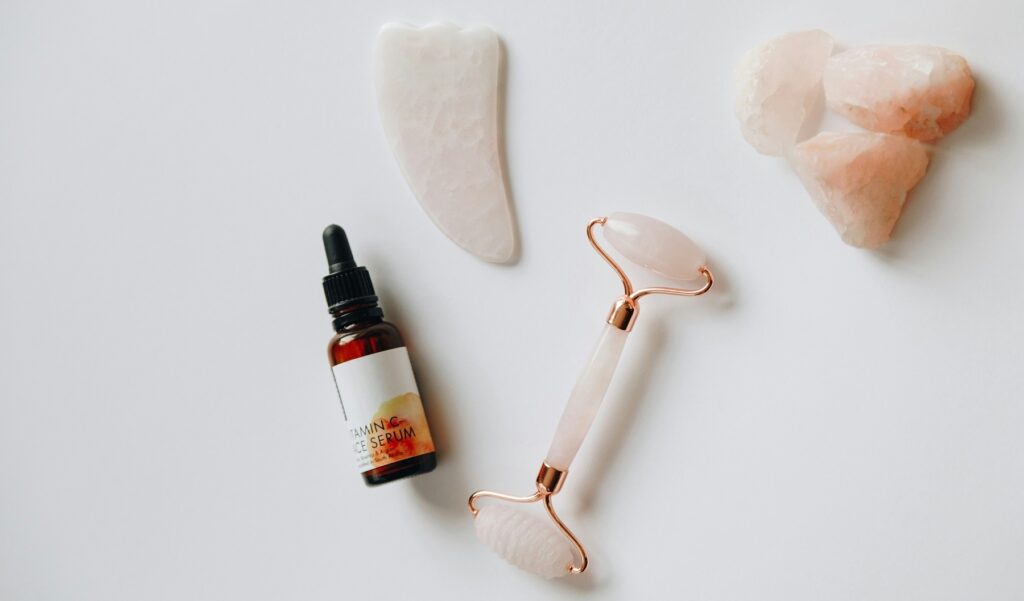Have you ever felt lost in a sea of skincare options, unsure which products will actually benefit your skin? You’re not alone. With so many choices, it can be challenging to find a routine that truly meets your skin’s unique needs. But here’s the good news: your skincare routine doesn’t have to be complicated to be effective.
Shay Glisson, FNP-BC, Midwest Facial Plastic Surgery’s aesthetic nurse practitioner, takes a personalized approach to skincare. She knows that healthy skin is more than just a beauty goal—it’s essential for your overall well-being. In this blog post, we’ll go through three tailored skincare routines specifically designed for acne-prone, aging, and sensitive skin.
Ready to find the perfect routine for your skin type? Read on to discover expert insights that will help you achieve your healthiest, most radiant skin yet.
Routine 1: Skincare for Acne-Prone Skin
Managing acne-prone skin as an adult can be challenging, but a well-structured routine can help reduce acne, prevent new blemishes, and keep your skin balanced. Here is a step-by-step guide to crafting an effective skincare routine for acne-prone skin:
- Cleanse Effectively:
Cleansing is the cornerstone of any acne care routine. It is essential to remove excess oil, dirt, and impurities that can clog pores and contribute to breakouts. For acne-prone skin, a gentle foaming cleanser is often the best choice. Foaming cleansers are effective at removing oil without over-drying or irritating the skin.
Look for cleansers with acne-fighting ingredients like salicylic acid. Salicylic acid penetrates the pores to exfoliate from within, helping to reduce blockages and prevent future breakouts. Cleanse your face twice daily—once in the morning and once at night—to keep your skin clean without over-stripping it of its natural moisture.
If you have acne-prone skin, Shay recommends Société Clinical Skincare’s AHA or BHA cleansers. - Exfoliate Carefully:
Exfoliation helps remove dead skin cells that can clog pores and lead to acne. However, with acne-prone skin, it’s important to choose the right type of exfoliant. Over-exfoliating or using harsh physical scrubs can irritate the skin, making acne worse.
Instead, opt for a chemical exfoliant like glycolic acid or lactic acid. These ingredients gently dissolve the bonds between dead skin cells, allowing them to be washed away without causing irritation. Limit exfoliation to 1-2 times per week to avoid over-drying or irritating the skin.
A good exfoliant for acne-prone skin would be routine Chemical Peels or BHA foaming face wash by Société Clinical Skincare. - Moisturize Without Clogging Pores:
Many people with acne-prone skin skip moisturizer, fearing it will make their skin oilier. However, moisturizing is a crucial step in any skincare routine. When your skin is deprived of moisture, it can actually produce more oil to compensate, potentially leading to more breakouts.
Choose a lightweight, oil-free moisturizer specifically labeled “non-comedogenic,” which means it won’t clog pores. Look for ingredients like hyaluronic acid, which hydrates without adding oil, or niacinamide, which helps regulate oil production and reduce inflammation. A good moisturizer will help maintain your skin’s balance, keeping it hydrated without causing additional breakouts.
For an oil-free moisturizer, Shay recommends using EltaMD AM or PM Therapy for dryer skin. - Protect with the Right Sunscreen:
Sun protection is essential for everyone, including those with acne-prone skin. Unprotected sun exposure can lead to dark spots, hyperpigmentation, and can even exacerbate acne scars. However, choosing the wrong sunscreen can clog pores and lead to breakouts.
Opt for a broad-spectrum sunscreen with an SPF of 30 or higher. Look for an oil-free, non-comedogenic formula. Mineral-based sunscreens, which contain zinc oxide or titanium dioxide, are generally less irritating for sensitive or acne-prone skin. They provide effective protection without causing breakouts, making them an excellent choice for daily use.
When it comes to sunscreen, we’re always eager to recommend EltaMD to our patients. As the #1 dermatologist-recommended professional sunscreen brand, EltaMD creates products to protect, heal, and renew all skin types.
Additional Treatment Options:
Microneedling: If you suffer from chronic acne, microneedling might be a great option for you. When paired with the right skincare products, this treatment can work wonders. The tiny punctures from microneedling help your skin better absorb the active ingredients, leading to noticeable improvements.
Microdermabrasion: This is one of the easiest and most effective ways to give your skin a fresh start. By gently removing the outer layer of dead skin, this treatment can help you tackle mild acne in a non-invasive way.
Routine 2: Anti-Aging Skincare Routine
As we age, our skin naturally changes. We might notice fine lines, wrinkles, and less firmness due to a drop in collagen and elastin. A good anti-aging skincare routine can help keep your skin looking youthful and vibrant. This routine should include lots of hydration, effective active ingredients, sun protection, and maybe some professional treatments. These steps can help slow down the signs of aging and keep your skin looking its best.
- Focus on Hydration and Repair:
Hydration is key to any effective anti-aging skincare routine. As we age, our skin tends to get drier and less capable of holding onto moisture, which can make fine lines and wrinkles more noticeable. Start your routine with a hydrating cleanser that gently removes impurities without stripping the skin of its natural oils.
Follow with a toner or serum containing hyaluronic acid — a powerful humectant that attracts and retains moisture in the skin. Hyaluronic acid can hold up to 1,000 times its weight in water, providing immediate and lasting hydration that plumps the skin and reduces the appearance of fine lines.
For a moisturizer with anti-aging properties, Shay recommends using Société Clinical Skincare’s Skin Hydration and Intense Firming Complex. - Incorporate Anti-Aging Ingredients:
To effectively combat the signs of aging, it’s important to incorporate certain active ingredients into your skincare regimen. Retinoids are among the most researched and effective ingredients for anti-aging. They work by increasing cell turnover, stimulating collagen production, and reducing the appearance of fine lines, wrinkles, and age spots. Start by using retinoids a few times a week, gradually increasing frequency as your skin builds tolerance.
Peptides are another powerful ingredient to look for. These short chains of amino acids act as building blocks for essential proteins in the skin, like collagen and elastin. Peptides help to firm and strengthen the skin, improving texture and reducing sagging.
Antioxidants like vitamin C are also crucial in an anti-aging routine. Vitamin C brightens the skin, evens out skin tone, and protects against environmental damage. Incorporating a vitamin C serum in the morning can boost your skin’s defense against UV rays and pollution while promoting a youthful glow. - Sun Protection is Key:
Daily sun protection is perhaps the most critical step in any anti-aging skincare routine. UV rays from the sun are a primary cause of premature aging, which manifests as wrinkles, dark spots, and loss of skin elasticity. Even on cloudy days, up to 80% of UV rays can penetrate the skin, making sun protection a year-round necessity.
Use a broad-spectrum sunscreen with an SPF of 30 or higher every morning, regardless of the weather or your plans for the day. Reapply every two hours if you’re outdoors, and don’t forget areas like your neck, hands, and around the eyes, which are also prone to signs of aging. - Consider Professional Treatments:
While a well-curated at-home skincare routine is essential, professional treatments can significantly enhance your anti-aging efforts. By booking a consultation with Shay Glisson, FNP-BC, together you can explore options tailored to your skin’s needs and aging concerns.
Chemical peels, for instance, remove the top layer of dead skin cells, revealing smoother, brighter skin underneath and encouraging new cell growth. Laser skin treatments target deeper layers of the skin to stimulate collagen production, reduce pigmentation, and improve skin texture. Microneedling, another popular in-office procedure, uses tiny needles to create micro-injuries in the skin, triggering the body’s natural healing process and boosting collagen and elastin production.
These treatments, combined with a solid at-home regimen, can deliver more targeted and noticeable results. Regular consultations with a skincare professional can help adjust your routine over time, ensuring that your skin remains healthy and youthful as you age.
Routine 3: Skincare for Sensitive Skin
Sensitive skin requires a thoughtful and gentle approach to avoid irritation and maintain a healthy, balanced complexion. Here is a guide to crafting an effective skincare routine for sensitive skin:
- Simplify Your Skincare Routine:
For sensitive skin, less is often more. A streamlined skincare routine minimizes the risk of irritation and allows your skin to thrive. Start with the basics: a gentle cleanser, a soothing moisturizer, and a protective sunscreen. These three steps form the foundation of a routine that cleanses without stripping, hydrates without clogging, and protects without aggravating the skin.
Avoid products with long ingredient lists, as they are more likely to contain potential irritants. Keep your routine simple to reduce the likelihood of triggering an adverse reaction. By sticking to the essentials, you allow your skin to repair itself and maintain its natural balance.
For sensitive skin, Shay recommends using Société Clinical Skincare’s Pure Cleanser followed by EltaMD’s UV Daily. - Look for Gentle, Fragrance-Free Products:
When selecting skincare products for sensitive skin, opt for those specifically designed to be gentle and soothing. Look for labels that mention “hypoallergenic” and “fragrance-free,” as fragrances and dyes are common culprits of skin irritation. Products formulated for sensitive skin are less likely to contain harsh ingredients that can cause redness, itching, or discomfort.
For those with sensitive skin, Société Clinical Skincare products are excellent, as they are free of fragrances, parabens, and sulfates. - Introduce New Products Slowly:
Sensitive skin is more reactive, which means it’s crucial to introduce new products cautiously. When trying a new product, start by applying it once every few days to a small area of your skin to see how it responds. This “patch testing” approach can help you identify any adverse reactions before fully incorporating the product into your routine.
Gradually increase usage over a week or two, monitoring your skin for any signs of irritation, such as redness, dryness, or itchiness. If you notice any negative reactions, discontinue use immediately. This slow and steady approach minimizes the risk of overwhelming your skin and helps ensure that new additions complement rather than disrupt your existing routine. - Protect Your Skin Barrier:
The skin barrier is your first line of defense against environmental aggressors, allergens, and irritants. A compromised skin barrier can lead to increased sensitivity and a greater likelihood of reactions. To protect your skin barrier, choose products that reinforce and repair this vital layer.
Look for moisturizers and serums containing ceramides and fatty acids, which are essential components of a healthy skin barrier. Avoid over-cleansing, which can strip the skin of its natural oils, leading to dryness and irritation. Stick to a gentle, sulfate-free cleanser and limit washing to twice a day—once in the morning and once at night.
Be mindful of exfoliation as well; harsh scrubs or frequent use of chemical exfoliants can damage the skin barrier. If you choose to exfoliate, opt for a mild formula designed for sensitive skin and use it sparingly, no more than once per week. Maintaining a strong skin barrier will help reduce sensitivity and keep your skin calm and balanced.
Personalizing Your Skincare Journey
Every skin type is unique, and finding the right routine can be a journey. By understanding your skin’s needs and seeking guidance from a professional like Shay Glisson, FNP-BC, you can create a regimen that supports your skin’s health and enhances your natural beauty. To get started, consider booking a consultation with our aesthetic nurse practitioner. You can also visit our office to explore our full line of skincare products. We’re here to help you find the perfect routine for your skin!


